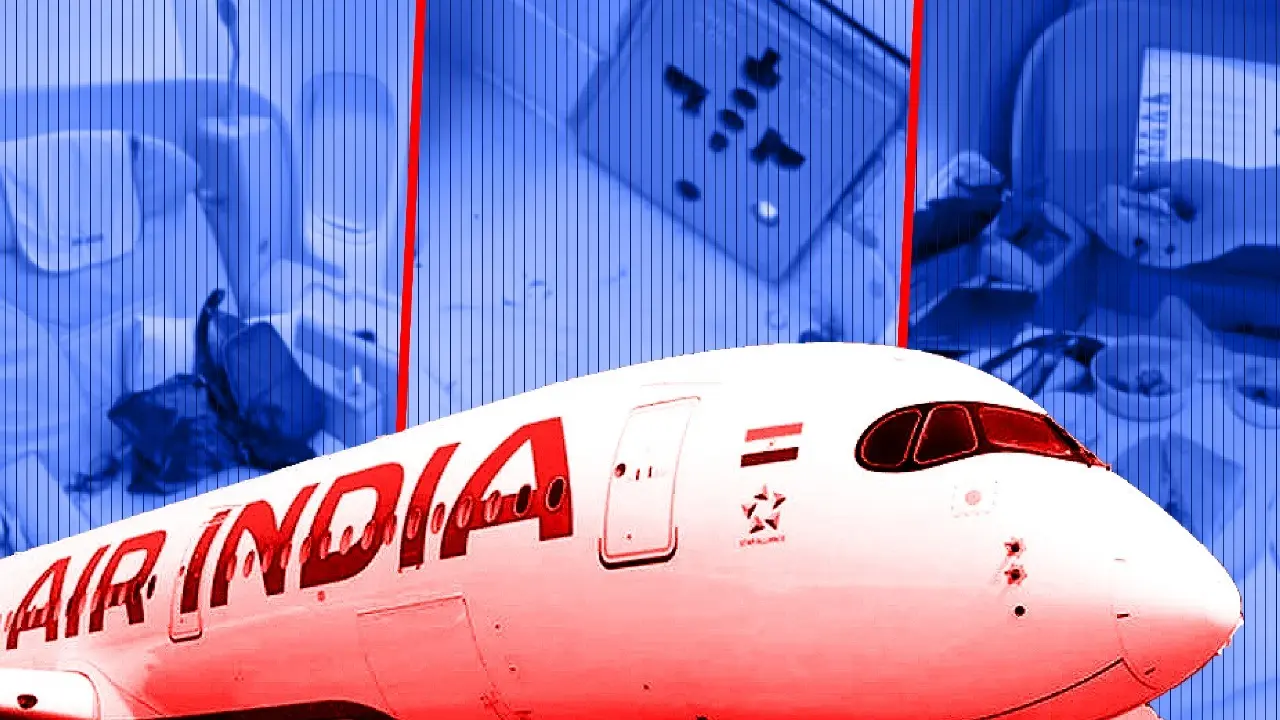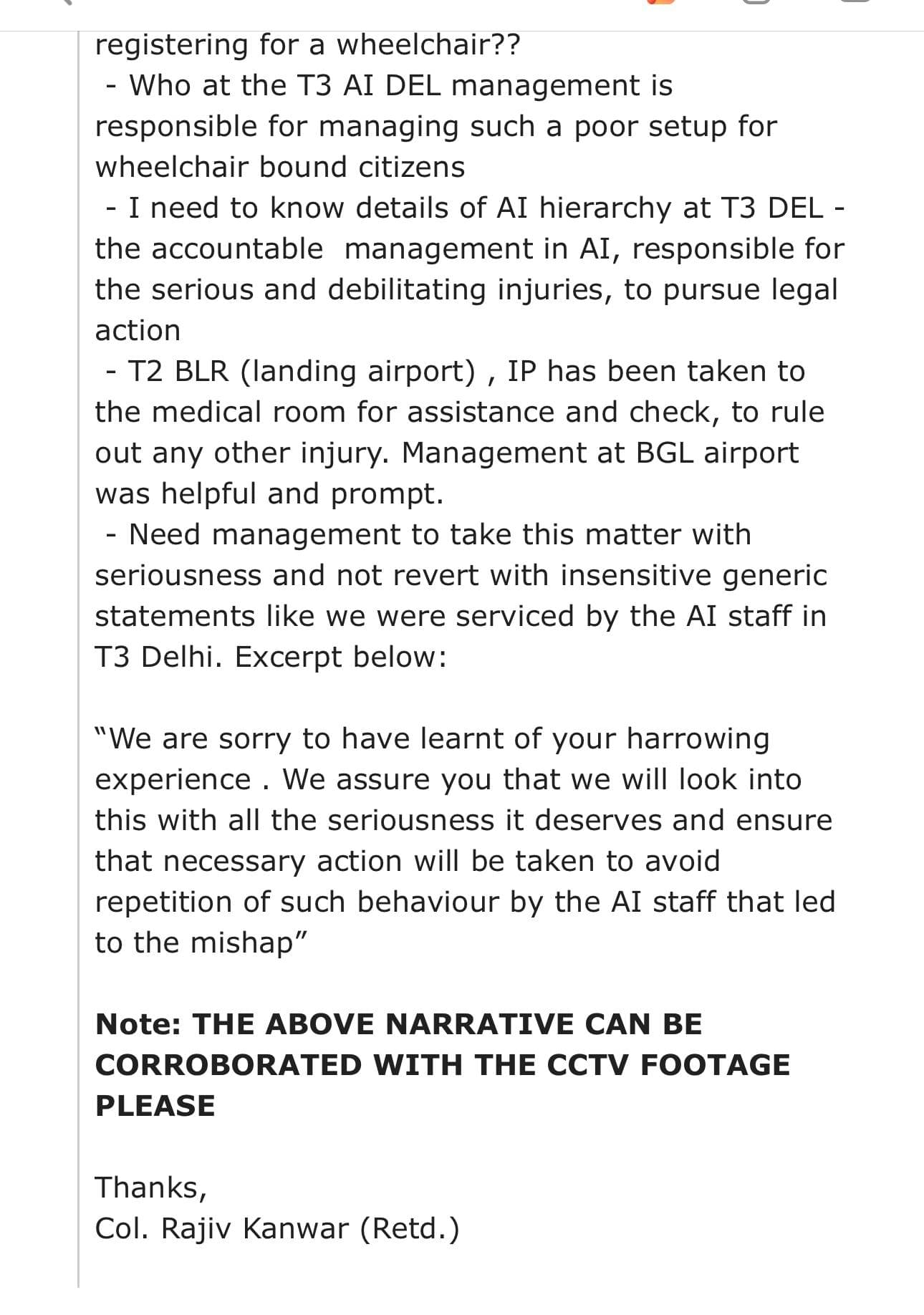Advertisement
Updated March 8th 2025, 23:14 IST
Air India Wheelchair Cruelty: Republic Accesses Passenger's Complaint | Read The Details
Republic exclusively accesses a complaint on Air India's wheelchair service, alleging delays, denial, or inadequate support for passengers in need.

New Delhi: Amid a raging controversy over Air India ’s treatment of passengers, Republic has exclusively accessed the complaint copy detailing a shocking case of alleged negligence. A woman, Parul Kanwar, took to social media to expose the airline’s failure, claiming that her 82-year-old grandmother was left injured after Air India failed to provide a pre-booked wheelchair at Delhi Airport. The elderly passenger was reportedly forced to walk, ultimately collapsing due to exhaustion. The distressing incident has sparked national outrage, raising serious concerns over the airline’s handling of passenger welfare.
In the complaint accessed by Republic, it is detailed how the octogenarian woman was forced to walk across three parallel road lanes, navigate through security, and reach the check-in counter—without any help or support from Air India or airport staff.
What Does the Complaint Claim?
Flight Details
- Flight No: AI 2600 (Delhi to Bengaluru)
- Departure Time: 1700h from T3, Delhi
- Web check-in was completed, and DigiYatra was enabled well in time.
- Wheelchair assistance was pre-booked, registered, acknowledged, and confirmed by Air India during ticket booking and web check-in (copy of ticket enclosed as Att 1).
- The passenger, Mrs. Raj Pasricha, is a chronic diabetic and heart patient with serious mobility issues.

Sequence of Events Leading to the Incident
- The passenger arrived at T3 at 1445h on March 4, 2025.
- Directed to the wheelchair assistance desk, located across three parallel road lanes near the departure terminal entrance.
- Reached the wheelchair assistance help desk at 1500h and requested assistance from Mr. SC Verma (AI Service Coordination Assistant) between 1500h and 1530h.
- Mr. Verma expressed helplessness, stating that the matter was beyond his control and only his senior in charge, Mr. Shyam, could intervene.
- As no wheelchair was provided, the family tried speaking to Mr. Shyam and requested assistance again. They were told that wheelchair availability was being arranged as per availability, and flight departure time was not a priority.
- By 1550h, no confirmation of wheelchair availability was given.
- With no assistance, Mrs. Raj Pasricha was forced to walk across three parallel road lanes, through security, and up to the check-in counter. No help or support was provided by Air India or airport staff.

Serious Consequences of Negligence
Due to the strain and anxiety caused by the airline’s insensitive and careless handling, the 82-year-old woman collapsed in front of the Air India check-in counter (premium economy section), suffering head injuries, a bleeding nose, a cut upper lip and tongue, and broken teeth.
Despite the severity of the situation, Air India staff neither helped lift the injured passenger nor facilitated medical assistance.
Her grandson, Nikhil Jasrotia (travelling with the passenger, PNR 6SSYLG), repeatedly pleaded with AI staff to call the medical room. However, no support was provided, apart from pointing them in the direction of the MI room.
Eventually, family members lifted the injured passenger and seated her on a bench. They were then forced to run around seeking medical attention on their own.
No Accountability from Air India Staff
Despite multiple attempts to request wheelchair assistance from various counters—including the wheelchair assistance counter, DigiYatra counter (where Indigo provides free wheelchairs but did not in this case due to Air India booking), and the premium economy check-in counter—no meaningful corrective action was taken by Air India staff at T3.

Key Questions Raised in the Complaint
- Is there no Standard Operating Procedure (SOP) for timely wheelchair assistance, which was requested as per Air India’s protocol?
- If a wheelchair-bound passenger were travelling alone, is the expectation that they must navigate drive-through lanes unaided, reach the AI wheelchair counter, and then wait their turn? What is the purpose of pre-booking/registering for a wheelchair?
- Who at T3 AI Delhi management is responsible for managing such an inadequate system for wheelchair-bound passengers?
- Who in AI hierarchy at T3 is accountable for the serious injuries suffered by the passenger, and what legal action can be taken?
- Upon arrival at T2 Bengaluru (BLR), medical room assistance was promptly provided by BGL airport management, which was helpful and responsive.
- Why did Air India not handle the situation with seriousness instead of issuing generic statements?

Air India’s Response
In response to the complaint, Air India issued the following statement:
“We are sorry to have learnt of your harrowing experience. We assure you that we will look into this with all the seriousness it deserves and ensure that necessary action will be taken to avoid repetition of such behaviour by the AI staff that led to the mishap.”

'Such little value for human life and wellbeing'
Taking to X, Parul Kanwar called out Air India's negligence as she narrated the distressing account of the incident. “I post this because I have no choice, and because it infuriates me that there is such little value for human life and wellbeing. Air India, you treated my grandmother so poorly, and with such little regard,” Kanwar said.

Defensive Air India Counters Passenger, Refuses to Accept Blame
Amid public outrage, an Air India spokesperson defended the airline, stating that the family had arrived later than the recommended check-in time and that at no point was wheelchair assistance denied.
“There are allegations on media platforms that an elderly lady suffered grievous injuries at Delhi Airport due to Air India’s negligence. While we fully empathize with her and wish her a swift recovery, we would like to clarify the following based on our investigation:
“The passenger, travelling with her family, arrived at the departure terminal much later than the recommended two hours before departure.”
The airline further alleged that the family reported to the Persons with Reduced Mobility (PRM) desk less than 90 minutes before the scheduled departure to request a wheelchair.
“Due to an unprecedented peak in demand at that hour, a wheelchair could not be provided within the 15 minutes the family spent waiting. The claim that the passenger waited for an hour is baseless,” the airline stated.
The airline also contended that the passenger had walked of her own accord. “On their own accord, the passenger decided to walk with her companions. Unfortunately, she suffered a fall at the airport. Upon noticing the incident, Delhi Airport officials and the on-duty airport doctor immediately attended to her and provided first aid.”
Air India further claimed that the doctor’s offer for additional medical assistance was declined, and the family chose to continue their journey to Bengaluru.
“We understand that the doctor’s offer for further medical attention was declined, and the family insisted on continuing their travel. Throughout the process, Air India staff were courteous, assisting them through check-in, priority security, and boarding. The passenger also received necessary care during the flight from Delhi to Bengaluru.”
Concluding its statement, Air India reiterated that at no point was wheelchair assistance denied.
“Upon reaching Bengaluru, at the family’s request, the passenger was escorted by our staff for further medical attention at Bengaluru Airport and later to the drop-off point.
“At no stage was a wheelchair or assistance denied. Air India’s staff cooperated fully with the guests throughout their journey. We have reached out to the guest’s family and wish her a speedy recovery.” Earlier, Air India responded to the woman’s granddaughter’s post, stating they would like to connect with her over a call.
Air India's Wheelchair Policy
As per Air India’s official website, passengers requiring wheelchair assistance should notify the airline at the time of booking, ticket issuance, or reconfirmation of their reservation.
“To prevent last-minute inconveniences or unavailability, travellers are advised to pre-book wheelchairs during the reservation or ticketing process,” states the airline.
Passengers who are elderly, physically weak, or have a medical condition can avail of wheelchair assistance at no additional cost.
For individuals who are medically unfit and need a wheelchair, Air India mandates the submission of a Medical Information Form (MEDIF) duly completed by a doctor. This form must be submitted at the nearest Air India office.
The airline’s medical team will review the request, a process that requires at least 72 hours for approval.
DGCA Guidelines on Wheelchair Assistance
As per India’s aviation regulatory authority, the Directorate General of Civil Aviation (DGCA), passengers with disabilities or reduced mobility who hold valid flight bookings are entitled to necessary assistance upon arrival at the airport. Airlines are required to cater to their specific needs and facilitate smooth travel, ensuring they are assisted from the departure terminal to the aircraft and, upon arrival, from the aircraft to the exit of the arrival terminal—free of charge.
The Civil Aviation Requirements (CAR) outline the protocols airlines must follow to support travelers with disabilities or mobility limitations.
Under paragraph 4.1.1, the CAR specifies: “No airline shall deny transportation to individuals with disabilities or reduced mobility, including their mobility aids, assistive devices, personal attendants, and guide dogs in the cabin—provided such passengers or their representatives inform the airline about their needs during the booking process.”
In 2022, the DGCA reinforced these regulations, making it unlawful for airlines to deny boarding to passengers with disabilities. This amendment was introduced following an incident where a specially-abled child was denied boarding on an IndiGo flight.
The revised CAR states: “An airline shall not refuse travel to any individual based on disability. However, if an airline perceives that a passenger’s medical condition may deteriorate mid-flight, a medical evaluation will be required. A qualified doctor must assess the individual’s condition and clearly determine their fitness to travel. The airline will then make a final decision based on the medical opinion provided.”
In February 2023, Air India was penalized ₹30 lakh after an 80-year-old traveler collapsed at Mumbai airport and subsequently passed away due to the non-availability of a wheelchair. Following this unfortunate event, the DGCA issued an advisory directing all airlines to ensure the sufficient provision of wheelchairs at airports.
Get Current Updates on India News, Entertainment News along with Latest News and Top Headlines from India and around the world.
Published March 8th 2025, 15:13 IST
